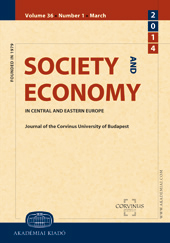Poland and the Euro: between lock-in and unfinished transition
Poland and the Euro: between lock-in and unfinished transition
Author(s): Anna Visvizi, Paweł TokarskiSubject(s): National Economy, Economic policy, Economic development, Public Finances
Published by: Akadémiai Kiadó
Keywords: Eurozone; Poland; transition; historical institutionalism; policy reform process;
Summary/Abstract: In the otherwise rich debate on the eastward expansion of the Eurozone, fragmented approaches prevail, leaving several conceptual avenues of this process underexplored. The case of Poland – initially a fervent enthusiast of the euro adoption and a somewhat assertive endorser today – offers in this context an opportunity to add to the debate and deepen our understanding of the logic behind eastward expansion of the Eurozone. In what follows, Poland’s prospective Eurozone entry is examined from the broader angle of the historically determined conceptual and policy-making context of systemic transition. To this end, a conceptual nexus between Eurozone expansion and transition is established and examined through the historical institutionalist perspective. It is argued that rather than being solely a function of Poland’s EU membership, both the decision to adopt the euro and the attainment of real and nominal convergence are predominantly a function of the, as yet unfinished, transition process. Interestingly, as this paper suggests, the inconsistency inherent in the execution of the Maastricht convergence criteria not only creates disincentives that effectively delay Poland’s Eurozone entry but also triggers reform-drift and backsliding, thus casting a shadow on the prospect of the completion of the Polish transition and its sustainability.
Journal: Society and Economy. In Central and Eastern Europe ǀ Journal of the Corvinus University of Budapest
- Issue Year: 36/2014
- Issue No: 4
- Page Range: 445-468
- Page Count: 24
- Language: English

